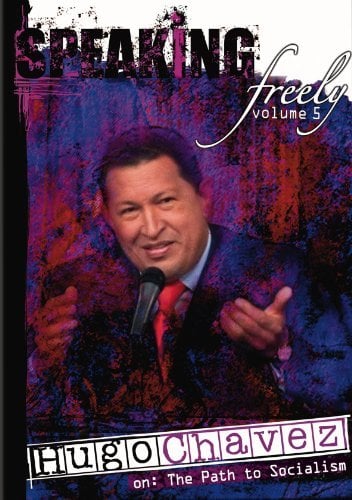
Now that one of Latin America’s most controversial figures has died, it is interesting to look back at his actions, actions that will reverberate in the western hemisphere for some time to come.
This is a short piece (about 52 minutes) that is clearly a love letter from the maker, Cinema Libre Studio. The whole film is just Chávez expounding about his ideas on capitalism and socialism.
It is much like a state of the union address.
The Venezuelan president was part of the new left in Latin America, which includes Rafael Correa of Ecuador, Evo Morales of Bolivia, the Kirchners in Argentina, Paraguayan President Fernando Lugo, and Brazilian President Lula.
Chávez did not hide is disdain for capitalism, considering it a destructive force in the world. But he was not a proponent of socialist theory.
The socialism he envisioned was one where the community looked after itself before profit. Chávez criticized Marxists and Josef Stalin for their mistakes in inculcating a top-down approach to socialism.
He also took issue with some statements made by Simon Bolivar, who is practically Venezuela’s patron saint.
It was not only his embrace of socialism that set the United States’ teeth on edge but also his close relationships with Cuba’s Fidel Castro and Iranian President Mahmoud Ahmadinejad.
According to Chávez there is a need for a new socialism, one that evolves through trial and error.
According to a recent opinion piece in the Los Angeles Times, “From 1997 to 2011, he [Chávez] reduced the percentage of people living in moderate poverty from 54% to 31%, and those living in extreme poverty from 23% to 9%, according to the World Bank.”
He called his movement the Bolivarian Revolution and it remains to be seen if Vice President Nicolas Maduro can carry the torch now that Chávez is gone.
While Chávez claimed to be a proponent of inclusive politics and transparency, he clamped down on the press and granted himself more time in office.
Chávez claimed the United States was trying to undermine his rule and even assassinate him. One could in some way understand his paranoia given U.S. President George W. Bush supported a 2002 coup d’etat that briefly removed Chávez from power. So what is to be learned from Chávez’s reign in Venezuela?
Some say he was a populist like Argentina’s Juan Perón but Chávez dismissed that assertion, claiming he was a socialist.
Was his time in power a David and Goliath story, where his small country was in a deadly battle with the United States, also known in Latin America as the “Colossus of the North”? Or was he Robin Hood, stealing from the nefarious oil companies and spreading the wealth to his country’s poorest? Or was he a quixotic figure, a dreamer who did not fully grasp the need for capitalism to foster growth in Venezuela? Maybe he was a clown, a charismatic buffoon who riled up the population just to feed his own ego.
It is possible he was all those things.
For more information about Chávez and the leftward turn in South America, see older blogs entries here and here.
Now, as we wait with baited breath, it remains to be seen what will happen in Venezuela now that Chávez is dead.
Speaking Freely Volume 5: Hugo Chávez is available to rent.
Murphy can be reached at: [email protected]